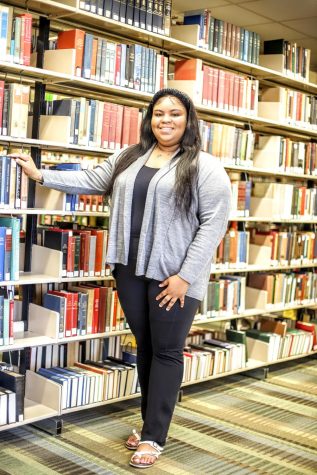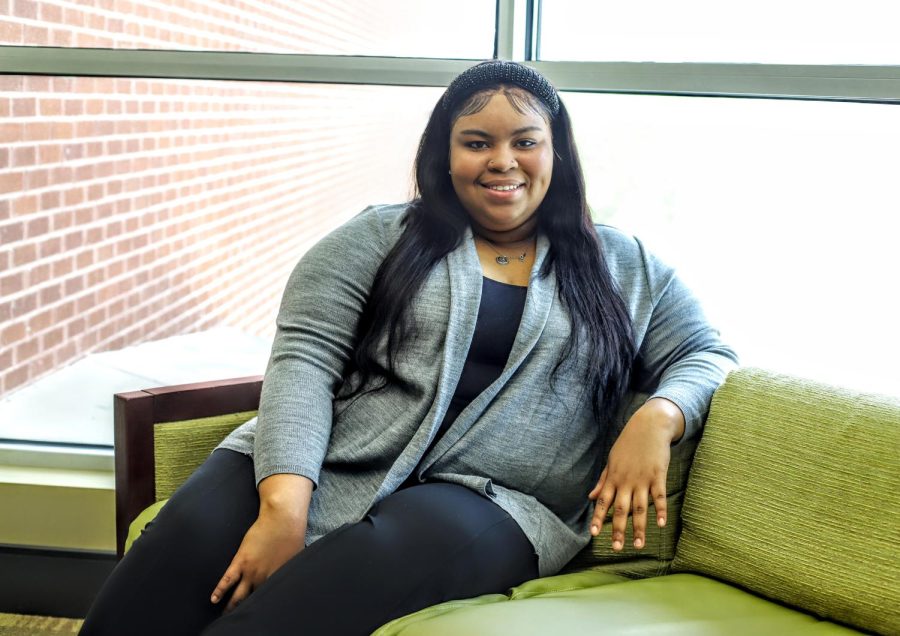Senior Tyfani Turpin turns new interest into a lasting career
Tyfani Turpin initially enrolled with plans to study architecture but was discouraged to find that ASU does not have the program. As a substitute, she decided to turn to a childhood hobby into a formal course of study. Since changing her major to theater, Turpin has developed the closest connection to Brian Martin, MFA, the chair of the theatre department.
May 6, 2022
Tyfani Turpin comes from Dayton, Ohio, where she is the youngest of the three children of Kevin and LaDonna Turpin. As she was surrounded by a community of loved ones, she appreciates the immense amount of support they offered over the years. As a teenager, she attended Trotwood-Madison High School, where she took part in the school’s band and Muse Machine, a non-profit organization focused on exposing the children of the area to the joys of performing arts. This extracurricular involvement sparked Turpin’s curiosity for the performing arts.
“I have always had an interest in the arts,” she said. “I just needed a bit more motivation to actually get into it.”
She graduated from Trotwood-Madison in 2018 with plans to continue her education as a Hornet of Alabama State University. Though this choice was motivated by an academic scholarship, she was especially excited by the thought of attending a Historically Black College or University.
“The fact that they gave me scholarship money, and it is a HBCU, made me want to come even more,” she said.
Turpin initially enrolled with plans to study architecture but was discouraged to find that ASU does not offer that degree program. As a substitute, she decided to turn a childhood hobby into her formal course of study. She joined the College of Visual and Performing Arts as a theatre major with little experience and lots of enthusiasm.

“When I began to learn more about theatre and the things that people do that are involved with theatre, it made me what to do it more.”
Though she had a non-traditional background compared to many of her peers within the theatre department, Turpin considers her acclimation to COVPA to be have been seamless. She describes the culture of the theatre department to have been family-like and welcoming as she began her journey in a new field. This experience not only allowed her to be find comfort in her studies, but also in her overall ASU experience.
“Theatre is not as easy as it looks,” she said. “It can be very challenging because it does come with a lot of responsibilities. So, they are very welcoming to anybody that comes in.”
Of the theatre faculty, Turpin has developed the closest connection to Brian Martin, MFA, the chair of the theatre department. Martin offered special attention to her as he respected her budding potential and zest. As she grew in the art, and invested more time, their bond has only grown.
“He always took a chance on me, and took the time to help me when needed,” she said.
This special care was desired considering that much of Turpin’s developmental period was done remotely due to the pandemic. Normally, she would have spent this time running lines with peers, preparing for shows, and honing on-stage chemistry. Instead the theatre department and its students were constrained by the guidelines of the pandemic .
“We were not able to do any shows for a whole year,” she said. “We were not able to have the correct practice of teaching for a whole year. We were not able to meet up and do anything like that.”
Though the pandemic robbed Turpin of essential moments of her theatre experience, she was determined to make the best of the situation. She found solace in the library during this time. The Levi Watkins Learning Center offers four floors of prime study space, Turpin would spend a considerable amount of time there to focus on her craft.
“That is when I feel that I started to mature a lot more,” she said. “In high school if I did not necessarily know the work or did not want to do it, it would be, ‘it is what it is.’ But when I got to college everything started to change. I had to look at everything differently.”
Aside from her studies, Turpin also took part in the National Society of Leadership and Success, Alpha Psi Omega, Phi Beta Lambda, and F.L.Y. Girls. These affiliations worked to promote leadership and professional development through collaborative work and various forms of university involvement. Turpin’s favorite memory as a Hornet lies in her membership with Alpha Psi Omega. She fondly remembers times learning dances with her line brothers and siblings, as some were more coordinated than others.
“Not necessarily strolls, but they were dances,” she said. “When we were in the process, there were some people who can dance and there were some who could not dance. We were dancing to a song called Kim Possible.”
Turpin has learned many life lessons as a result of her commitments inside and outside of the classroom. Of them all, she has benefitted most from realizing that it is okay to take the first step. Not only did she enter the department with minimal experience, she also was considered to be very reserved and shy. She forced herself out of her comfort zone as she became increasingly engrossed in the program, and soon noticed all of the opportunities that are granted in return.
“My freshman year I was kind of in the shadows and really shy,” she said. “I had to realize that being shy was not going to get me anywhere, especially in the performing arts world.”
Her maturation has occurred as a result to these lessons and realizations. As Turpin has had the chance to implement these lessons into reality, she shares that many aspects of her life have changed for the better.
“They way that I carry myself and the way that I speak to people has changed,” she said. “I just believe that everything has improved since I exited from high school.”
Turpin has had many opportunities to showcase this maturity as the theatre department continues to reopen and host audiences. When on stage performing, she is able to show all of the skills that she has spent hours learning both inside and outside of the classroom. Her favoritve production that she has taken part in was titled Slamm’in: Our Lives in Verse, and was performed during the fall of 2021. The production primarily consisted of poetry and monologues while also incorporating song and dance, which forced her out of her comfort zone.
“I was able to open up a lot more, especially when it came to the dances and singing, trying to remember monologues, and more.”
Though her experience has been positive overall, Turpin calls for housekeeping restorations within the theatre department. She especially wishes for improved parking for theatre students, as they must choose between a dirt lot with potentially damaging debris or in the lot where they are often booted, and for transparency regarding fund allocation.
“I just think that there are a lot of things inside the school buildings that should get fixed but I feel that they use the money elsewhere,” she said. “I appreciate the track team and everything that they do and everything that they have won, but we have buildings that are falling apart and they do not fix it.”
She applauds the university’s efforts to showcase student achievements. She appreciates this encouragement considering ASU has such a close-knit community which instills confidence and pride in the student body.
“Especially when it comes to students who have received scholarships, they are going to make sure stuff like that gets spotlighted,” Turpin said. “There are a lot of teachers who actually go out of their way for a lot of students.”
Post-graduation, she plans to continue practicing her craft, through workshops and shows, in preparation to audition for Tyler Perry Studios. As her long-term goal is to be a regular actress for Tyler Perry Studios, she is willing to take all steps necessary to succeed.
Turpin advises that incoming Hornets stay on top of their curriculum and graduation requirements throughout their matriculation. She speaks against procrastination on assignments, advisement, and joining organizations as that will all benefit the student in the long-run. As she was forced to take 22 credit hours and join 2 organizations in her final semester, her advice comes from personal experience.
While she might have not been able to spend her final Hornet moments celebrating, she has still completed a task worthy of praise.
To graduate from an accredited art program with little prior experience is an admirable achievement, and is a testament of what is possible when hard work meets special care.







